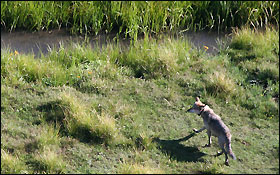Political move may hurt Ariz.’s gray wolves
That funny noise you heard as President Barack Obama signed the fiscal 2011 budget bill was the Endangered Species Act whimpering in pain.
The world’s premier environmental law took quite a beating.
A provision was tacked on to the budget bill that kicked wolves off the endangered-species list in Idaho, Montana, Oregon, Washington and Utah.
This is first time Congress has taken a species off the list in the nearly 40-year history of the law.
It was an act of political opportunism that could wind up hurting efforts to re-establish Mexican gray wolves in eastern Arizona and western New Mexico, even though it does not directly address this vulnerable population of predators.
Montana Sen. Jon Tester faces a tough fight to retain his seat in 2012. Political observers say Tester increased his chance of winning by writing the rider that removes Endangered Species Act protection from wolves in the northern Rocky Mountain states.
Wolf reintroduction has not been popular with ranchers and other powerful forces in Tester’s state. But the goals of the Endangered Species Act go way beyond local interests. The effort to reintroduce species to the habitats they once roamed is of national interest. It is national policy.
Science recognizes that ecosystems are impoverished by the loss of top predators like wolves.
In the years since wolves were reintroduced to Yellowstone National Park, they have had a significant and beneficial impact on the environment, biologists say. With wolves around, elk reverted to more typical prey behavior. Elk numbers decreased and they became more secretive. This led to cleaner streams and better habitat for fish.
Yes, there were conflicts with ranchers as wolf numbers increased in some states. Yes, hunters complained about the changes in the elk population.
Those are legitimate concerns. Given that the wolves in the Northern Rockies have established a healthy population, taking them off the endangered-species list might have been appropriate. In fact, efforts were under way to accomplish that.
There is a legal process that should have been followed.
Instead, Congress stepped in, and the president went along.
Together, they set a precedent that shows too little respect for a law that has served the nation well since 1973.
This model of how to circumvent the legal process could hurt Arizona’s wolves, which number only about 50 animals in the wild and desperately need protection.
There have been proposals in Congress to exempt the endangered Mexican gray wolf from federal protections. Doing this would be a serious betrayal of the nation’s natural heritage.
The Endangered Species Act and the creatures it protects deserve better treatment than they received from Congress and the president.
*********
This editorial was published in the AZ Republic on April 25, 2011.
PLEASE WRITE A LETTER TO THE EDITOR thanking the Republic for this editorial, supporting a strong Endangered Species Act, and calling for more, not fewer, protections for Mexican gray wolves. Include the information that only 50 Mexican wolves remain in the wild today; these magnificent animals are teetering at the brink of extinction.
Letters can be submitted here.
Thank you for all you do for endangered lobos.
Photo credit: This rare photo of a Mexican wolf in the wild shows a member of the Hawk’s Nest Pack. Courtesy of US Fish and Wildlife Service.



